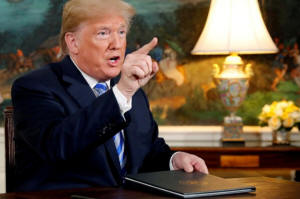|
New Trump sanctions on Iran take effect
despite pleas from allies
 Send a link to a friend
Send a link to a friend
 [August 07, 2018]
By Parisa Hafezi [August 07, 2018]
By Parisa Hafezi
ANKARA (Reuters) - New U.S. sanctions
against Iran took effect on Tuesday, and President Donald Trump, who
defied Washington's allies to impose them, pledged that firms doing
business with Tehran would be barred from doing business with the United
States.
Iran dismissed a last-minute offer from the Trump administration for
talks, saying it could not negotiate while Washington had reneged on a
2015 deal to lift sanctions in return for curbs on Iran's nuclear
program.
Trump decided this year to pull out of the agreement, ignoring pleas
from the other world powers that had co-sponsored the deal, including
Washington's main European allies Britain, France and Germany, as well
as Russia and China.
The European countries have promised to try to mitigate the impact of
renewed U.S. sanctions to persuade Tehran to continue to abide by the
deal's terms. But that has proven difficult: European companies have
pulled out of Iran, arguing that they cannot risk the prospect of damage
to their U.S. business.

"These are the most biting sanctions ever imposed, and in November they
ratchet up to yet another level. Anyone doing business with Iran will
NOT be doing business with the United States. I am asking for WORLD
PEACE, nothing less!" Trump tweeted on Tuesday.
White House national security adviser John Bolton said on Monday Iran's
only chance of escaping sanctions would be to take up an offer to
negotiate with Trump for a tougher deal.
"They could take up the president's offer to negotiate with them, to
give up their ballistic missile and nuclear weapons programs fully and
really verifiably," Bolton told Fox News.
"If the ayatollahs want to get out from under the squeeze, they should
come and sit down. The pressure will not relent while the negotiations
go on," said Bolton, one of the administration's main hawks on Iran.
REMOVE THE KNIFE
Washington accepts that Iran has complied with the terms of the 2015
deal reached under Trump's predecessor Barack Obama, but says the
agreement was flawed because it is not strenuous enough. Iran says it
will continue to abide by the deal for now, if other countries can help
protect it from the economic impact of Washington's decision to pull
out.
The so-called snapback sanctions target Iranian purchases of U.S.
dollars, metals trading, coal, industrial software and its auto sector.
In a speech hours before the sanctions were due to take effect, Iran's
President Hassan Rouhani rejected any negotiations as long as Washington
was no longer complying with the deal it reached three years ago.
[to top of second column]
|

President Donald Trump speaks to reporters after signing a
proclamation declaring his intention to withdraw from the JCPOA Iran
nuclear agreement in the Diplomatic Room at the White House in
Washington, U.S. May 8, 2018. REUTERS/Jonathan Ernst/File Photo

"If you stab someone with a knife and then you say you want talks,
then the first thing you have to do is remove the knife," Rouhani
said in a speech broadcast live on state television.
"We are always in favor of diplomacy and talks. ... But talks need
honesty," Rouhani said.
He dismissed the proposal for talks as a stunt to sow chaos in Iran
and confuse American voters at home ahead of mid-term elections in
November. He said Washington was becoming isolated internationally
and would come to regret imposing sanctions against the views of its
allies and other world powers.
The nuclear deal is closely associated in Iran with Rouhani, a
relative moderate who won two landslide elections on promises to
open up its economy to the outside world.
European countries fear that by abandoning the deal, Washington
risks undermining Rouhani and strengthening the hand of his more
hardline opponents, who have long argued that the West would never
allow Iran to prosper.
In a joint statement on Monday from Britain, France, Germany and the
EU as a bloc, they said: "We deeply regret the reimposition of
sanctions by the U.S."
Since the sanctions were initially lifted two years ago, Iranian oil
exports have risen.
But most Iranians have yet to see major economic improvement as a
result of the deal, and the prospect that Washington would re-impose
sanctions helped drive a collapse in the value of Iran's currency
this year, raising the cost of imports.
There have been protests in Iran against rising prices, and the
government has responded firmly.
(Writing by Peter Graff; Editing by Janet Lawrence)
[© 2018 Thomson Reuters. All rights
reserved.]
Copyright 2018 Reuters. All rights reserved. This material may not be published,
broadcast, rewritten or redistributed.
Thompson Reuters is solely responsible for this content.
 |